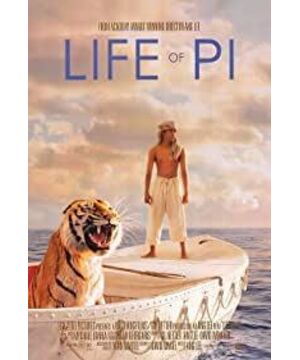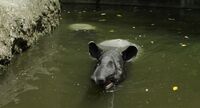For me, the allure of the movie is that it can help the audience easily enter the inner world of the director. Ordinary like us, eager to be nourished by a great mind. This is also a fatal temptation for those directors who are not bad money. So the big directors I like are actually exhibitionists in their hearts.
Although Ang Lee has made such films as the Hulk, he is indeed a trustworthy exhibitionist.
Juvenile Pi's fantasy drifting is a disgusting name from the name. Juvenile, fantasy, drifting, and π, which is related to mathematics, are all in my temperament. It has a less obnoxious English name, "life of pi", which literally translates the life of a fart. There will always be people who say that the English name is good, but this time the Chinese name fits the theme of the movie. The whole movie is a more curious story in the guise of a curious story.
But the main body of the story is suitable for presentation in a book, not a movie. One person and one tiger are too monotonous on the screen. Although the conflict is strong, the solution is too obvious: man tames the tiger. The moment of taming is also where the climax is. But think how boring such a climactic scene would be? Let the little boy direct the tiger to jump through the ring of fire? In fact, the movie does lack a real emotional high point.
The success of the original novel lies not in the curious setting of one person, one tiger and one leaf boat, but in finding an excellent structure to load the story. This structure was brought into the film intact. An opening that takes up one-third of the space introduces the life experience of young Pi, a religious and vegetarian Indian boy who went to Canada by boat with his family. At this time, the movie seemed to be endlessly dull, but luckily the ship sank in time. The second act that then begins is the main body of the story, which is packed with animals and danger aboard Pi's lifeboat. Then the tiger Richard Parker jumped out, roaring at greater danger, only to be tamed by the little boy who switched to meat. This cute story is as lovable as the little boy. Just as we were content to leave, he ripped up the previous one with another dark story. This tigerless story is like a slap by surprise, swiping away after the slap.
You have only one way out of this humiliation: chew the entire movie over and over, sucking every metaphor.
But after smacking the taste of it, I felt extremely lost. Because all the metaphors, from a zebra's broken leg to a mother's face appearing on the ocean floor, point to the same dark story. And this story is exactly Pi's second story, the one without the tiger. Therefore, the solution of every metaphor is not accompanied by the thrill of discovery, but the loss of no fairy tale.
The most disappointing thing is that I broke free from the metaphor and found that there is nothing in it. Those important words, the director put them in the lines. Only focus on the cuteness of big cats to get the best viewing experience.
-------------
As a digression, the interpretation of metaphors that cannot lead to no tiger stories is wrong. No way, this is the original setting. But there are some exceptions, and that is the structure changed by Ang Lee. But Ang Lee has made very few changes to the story, which is really disappointing.
But Ang Lee put in a lot of little details that I like :)
1: Pie's first love, Ananti. This character only exists in the movie. The meaning of her dance is "Eros hid a lotus in the depths of the forest". Later in Cannibal Island, it was the teeth in this lotus that woke Pi up. Pie also left the bracelet on the island.
2: Cannibal Island, here is the vaguest metaphor. The description in the original work can easily correspond to the waste utilization of cooks. But in the movie, the darkest layer was downplayed, and several episodes before going to the island were deleted, and the entire island was designed in the shape of a recumbent statue of Vishnu. Ang Dang is giving new meaning to the island and I love this lighthearted revision. But I don't like it as a metaphor, it's too vague, and it becomes easy to interpret it any way you want. My version is: Religion
3: When the tiger left, Pai lamented that he couldn't say goodbye to him.
There is an echo here with Ananti. Pi can remember all the details of the day he parted with Ananti, but he can't remember the scene of saying goodbye. So, it's his talent not to remember goodbye.
4: When I sent a boy, I cried when I told the Japanese story about no tigers.
When I was middle-aged, it was very peaceful to tell this story again. But when I told the story about the tiger, I cried.
In the end, this movie has a lot to say, but what I like most about it is the attitude of twisting my bleak life into a legendary story. This is really beneficial to my body and mind, and it is my goal in the future.
View more about Life of Pi reviews











